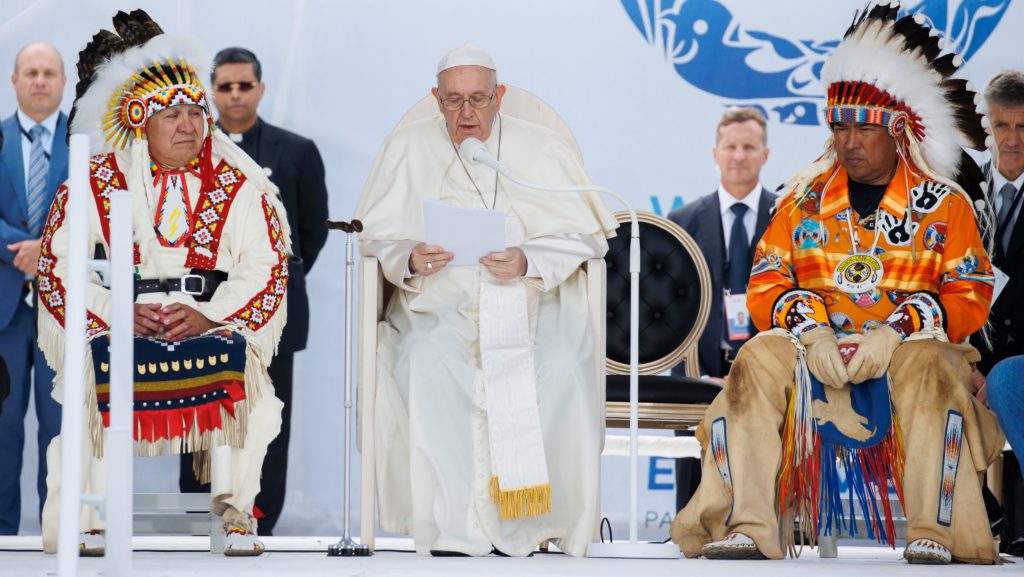Pope Francis apologized on Monday for “the harm that so many Christians have committed against indigenous peoples” in Canada, on the first day of a visit focused on addressing decades of abuses committed in Catholic institutions.
The religious leader’s repentance was met with applause by a crowd of natives from groups such as First Nations, Metis and Inuit, gathered in Maskwacis, where indigenous children were taken from their families and subjected to what is considered a “cultural genocide”.
“I apologize for the way in which many members of the Church and religious communities have cooperated, also through indifference, with these projects of cultural destruction and forced assimilation,” said the 85-year-old Argentine pontiff, who read his message while sitting.
“The assimilation and disengagement policies, which also included the residential school system, were harmful to the people of these lands,” he acknowledged.
The emotion of those present was palpable during his speech in Maskwacis, Alberta, about 100 kilometers south of Edmonton, where Ermineskin’s former boarding school, one of the largest in Canada, was in operation from 1895 to 1975.
Hundreds of people, many dressed in traditional garb, joined Canadian Prime Minister Justin Trudeau and Mary Simon, the country’s first indigenous governor-general, in the act. The indigenous leaders presented and placed on the pope a traditional feather headdress.
“The place where we find ourselves echoes a cry of pain, a suffocated cry that has accompanied me during these months,” Francis said, mentioning the “physical, psychological and spiritual abuse” suffered by children.
Several counselors were there to provide emotional support. Shortly before, volunteers distributed small paper bags to “collect the tears”.
Love tears
“First Nations believe that if you cry, you cry love, you save the tears on a piece of paper and put them back in this bag,” explained Andre Carrier of the Manitoba Metis Federation before the pope’s speech.
Volunteers will collect the bags and then burn them with a special prayer “to return tears of love to the Creator,” he said.
From the late 19th century to the 1990s, the government of Canada sent some 150,000 children to 139 Church-run boarding schools, separating them from their families, language, and culture. Many students suffered physical and sexual abuse by principals and teachers.
This system of cultural assimilation is believed to have caused the death of at least 6,000 minors from disease, malnutrition, neglect or abuse.
A delegation of indigenous people traveled to the Vatican in April and met with the pope, who formally apologized for this past.
But asking for forgiveness on Canadian soil means enormously to the survivors and their families, for whom the land of their ancestors is of particular importance.
Francis then visited the Church of the Sacred Heart of the First Peoples of Edmonton, where he delivered a second address to indigenous communities.
“I can only imagine the effort it must take to even think of a reconciliation,” the pope said.
“Nothing can remove the violation of dignity, the experience of evil, the betrayal of trust. Or remove our own shame, as believers,” he added.
To Canada’s shock and recognition of a dark past, more than 1,300 unmarked graves have been discovered at the sites of former boarding schools since May 2021.
The Canadian government, which has compensated alumni with millions of dollars, officially apologized 14 years ago for having created these schools to “kill the indigenous in the heart of the child”.
After the government, the Anglican Church also apologized. The Catholic Church, in charge of more than 60% of these schools, initially refused to do the same.
Healing journey
Canada is slowly opening its eyes to this past described as “cultural genocide” by a national commission of inquiry.
Long awaited, the papal visit, which will last for six days, generates hope among some survivors and their families. Many also expect symbolic gestures, such as the restitution of indigenous art objects held in the Vatican for decades.
On Tuesday, the pope will celebrate a mass at Edmonton’s Commonwealth Stadium where about 65,000 people are expected, before heading to Lake Sainte-Anne, site of a major annual pilgrimage. On Wednesday, the pontiff will visit Quebec before the last leg of the trip, on Friday in Iqaluit (Nunavut), a city in northern Canada, in the arctic archipelago.
Weakened by knee pain, the Argentine Jesuit appeared in a wheelchair during his arrival in Edmonton on Sunday. His schedule was accommodated to avoid large trips due to his health, according to organizers.



